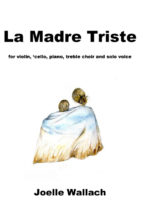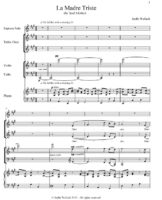La Madre Triste [7]
Based on what was originally the middle movement of a larger work, Piececitos, La Madre Triste is a vivid musical meditation on motherhood, migration and exile based on poems by Gabriela Mistral, the first Latin American to win a Nobel Prize in Literature. Set in the original Spanish, for soprano solo, treble choir, violin, cello and piano, La Madre Triste interweaves Latin American dance rhythms with haunting melodies: lullabies and laments of a mother on her treacherous journey toward refuge.
While the strings keen a contrapuntal lament, the sad mother croons a lullaby to the baby swaddled and swaying on her back. Her melody is a paraphrase of a 15th century Sephardic folksong, originally sung by Spanish Jews fleeing their own persecution. Intermittently, children sing along with the strings, echoes of hope and consolation.
La Madre Triste , like Piececitos as a whole, uses traditional musical patterns and pre-existing quotations to blend or contrast with newly composed elements/ Folkloric wisdom, generational and cultural ties clash in a mother’s inner dialogue of hope, terror and love as she struggles toward refuge for her children.




